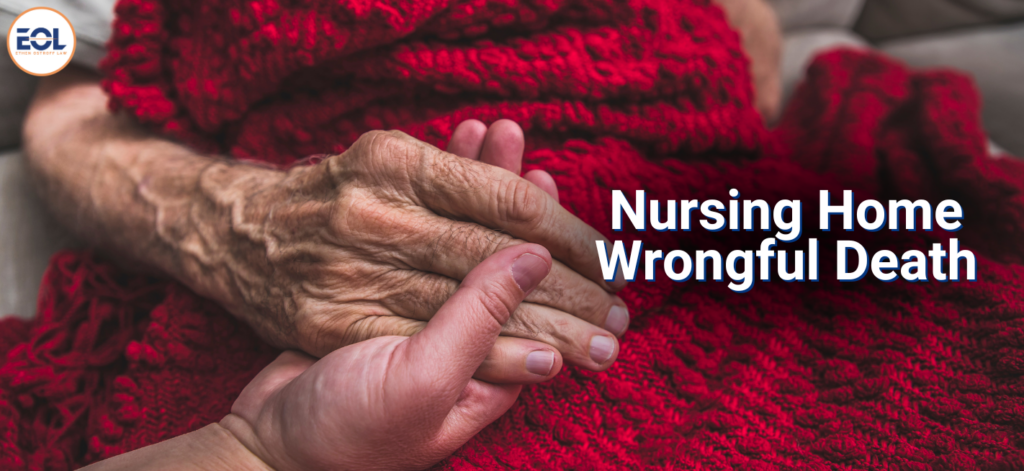Wrongful Death Nursing Home Lawsuits
In the serene environment of nursing homes, families entrust the well-being of their elderly loved ones to compassionate professionals. However, when negligence or abuse shatters this trust, it becomes imperative to grasp your rights. Wrongful death in nursing homes is a harrowing reality for countless families nationwide. In this comprehensive guide, Ethen Ostroff Law explores various facets of wrongful death nursing home cases, shedding light on what constitutes wrongful death and offering insights into legal options and avenues for compensation.
Wrongful Death in American Nursing Facilities
A nursing home, also known as a skilled nursing facility, serves as a residential haven where the elderly receive dedicated care and support around the clock. These facilities offer a range of services, encompassing medical assistance, personal care, and assistance with day-to-day activities.
Unfortunately, nursing homes don’t always fulfill their promise of providing a safe and nurturing environment for elderly individuals. Recent insights into the prevalence of wrongful death in American nursing facilities paint a troubling picture of systemic issues within the healthcare system:
- In 2019 alone, more than 2,500 individuals lost their lives in nursing homes due to neglect, translating to roughly one person every two days.
- The issue of nursing home neglect raises profound concerns, as numerous facilities fall short in ensuring safe conditions and adequate supervision, leading to injuries and tragic fatalities among residents.
- Annually, an estimated 300,000 wrongful deaths occur in the United States as a result of preventable injuries sustained within nursing homes or hospitals.

What Constitutes Wrongful Death in Nursing Homes?
Wrongful death in nursing homes refers to situations where a resident’s passing is a result of negligence, misconduct, or abuse by staff or management. This includes:
- Emotional abuse: Subjecting residents to verbal harassment, intimidation, or isolation, causing psychological distress that may contribute to premature death.
- Medical negligence: Failure to provide timely medical treatment or medication errors leading to fatal consequences.
- Neglect of basic needs: Ignoring residents’ hygiene, nutrition, or hydration needs, resulting in deteriorating health and eventual death.
- Physical abuse: Inflicting injuries or harm through physical violence, restraint misuse, or rough handling, leading to fatal injuries.
How Nursing Home Negligence Contributes to Wrongful Death
Nursing home negligence significantly contributes to wrongful death cases, increasing risks for vulnerable residents. Common manifestations include inadequate supervision, medical errors, and neglect of basic needs. Delayed responses to emergencies and a lack of preventive measures worsen the situation. Addressing these issues through comprehensive care standards is crucial for reducing wrongful deaths and ensuring resident safety.
Most Common Types of Nursing Home Neglect Resulting in Death
Several types of neglect in nursing homes can tragically lead to wrongful death:
- Dehydration and malnutrition: Insufficient food and water provision causing malnutrition and dehydration, resulting in wrongful deaths.
- Emotional abuse: Intimidation, bullying, or verbal abuse severely impacts residents’ health and leads to fatal consequences.
- Falls: Due to inadequate supervision or preventative measures, leading to fatal injuries and wrongful deaths.
- Inadequate supervision: Lack of proper oversight causing accidents like falls or choking, contributing to wrongful deaths.
- Medical errors: Mistakes in medical care such as medication errors or delayed treatment leads to wrongful deaths.
- Neglect of basic needs: Failing to provide essential care like hygiene maintenance leads to deteriorating health and wrongful deaths.
- Physical abuse: Rough handling or neglect causing injuries like burns and bruises, escalating to wrongful death.
- Poor infection prevention: Neglecting infection prevention protocols resulting in disease spread and increased risk of wrongful deaths among vulnerable patients.
Leading Causes of Wrongful Death in Nursing Homes
Various factors contribute to wrongful death in nursing homes:
- Inadequate training: Staff members lacking proper training may struggle to provide adequate care or respond effectively to emergencies, increasing the risk of fatal errors.
- Lack of supervision: Poor supervision enables abusive or negligent behavior to persist unchecked, endangering residents and leading to preventable deaths.
- Medical errors: Mistakes in medication administration, treatment planning, or diagnostic procedures can result in fatal consequences for vulnerable residents.
- Physical and emotional abuse: Acts of violence, coercion, or emotional manipulation by caregivers or fellow residents can inflict severe physical or psychological trauma, contributing to premature death.
- Understaffing: Insufficient staffing levels lead to overworked caregivers, neglecting residents’ needs and heightening the likelihood of preventable incidents.
Addressing these root causes of wrongful death enables nursing homes to establish safer environments for residents and prevent future tragedies.

Warning Signs of Nursing Home Abuse That Can Lead to Wrongful Death
To prevent wrongful deaths, it is crucial to recognize the warning signs of nursing home abuse. These signs include:
- Broken bones, suggesting physical abuse or neglect.
- Bruises, burns, and welts on the skin, indicative of physical abuse.
- Cuts, lacerations, and skin tears, pointing to inadequate care.
- Dehydration and malnutrition, signs of neglect.
- Facial and dental injuries, suggestive of physical abuse.
- Falls resulting in fractures or head injuries, indicating unsafe conditions.
- Infections progressing to sepsis, signaling inadequate medical care.
- Post-traumatic stress disorder, indicating emotional abuse or trauma.
- Stage 4 bedsores, indicating severe neglect.
- Sudden changes in behavior or mood, a potential sign of abuse.
- Unexplained sexually transmitted diseases, suggestive of abuse.
- Unexplained weight loss, indicating neglect or malnutrition.
These signs, ranging from subtle neglect to overt physical abuse, should be treated seriously to protect victims and prevent further harm leading to wrongful death.
Steps to Take If You Suspect Nursing Home Abuse
If you suspect nursing home abuse, taking the following steps is crucial for addressing the situation effectively:
- Call 911: In emergencies, dial 911 for immediate help and medical attention.
- Document signs: Keep notes of any signs or changes in your loved one’s condition.
- Gather evidence: Collect medical records and note any injuries or financial transactions.
- Contact an ombudsman: Seek assistance from a nursing home ombudsman for support.
- Consult a lawyer: Get legal guidance from a lawyer specializing in nursing home abuse cases.
What Happens If Someone Dies in A Nursing Home?
When a wrongful death occurs in a nursing home, several steps follow:
- Immediate response: Staff act quickly to ensure residents’ safety and address the situation.
- Notification and investigation: Authorities are alerted, and an inquiry determines what happened.
- Family notification: The family is informed about the death and given details about the incident.
- Legal consultation: The family seeks advice from a lawyer specializing in wrongful death cases.
- Filing a lawsuit: If they decide, the family files a lawsuit against the nursing home.
- Legal proceedings: The legal process unfolds, involving stages like gathering evidence and negotiations.
- Resolution: The case concludes either through a settlement or a court decision.
- Preventing future incidents: Legal action may raise awareness and encourage changes in the nursing home to prevent similar events.
Legal Options for Victims of Nursing Home Wrongful Death
When a loved one dies because of negligence or abuse in a nursing home, families are often left grappling with grief and seeking justice. Fortunately, there are legal avenues available to pursue accountability and compensation. These are:
- Mediation or arbitration: Families can consider alternative dispute resolution methods like mediation or arbitration to resolve conflicts efficiently outside of court.
- Nursing home wrongful death lawsuit: Filing a civil lawsuit against the nursing home and other responsible parties allows families to seek compensation for their loved one’s wrongful death and hold the facility accountable.
- Settlement negotiations: Parties can negotiate settlements out of court to avoid the lengthy and costly process of litigation while still addressing the family’s needs and seeking justice.
What to Know About Wrongful Death Claims
Understanding the legal aspects of wrongful death claims is crucial. Key considerations include:
- Burden of proof: Plaintiffs must prove negligence, causation, and damages to succeed in a wrongful death lawsuit.
- Statutes of limitations: Deadlines for filing lawsuits vary by state and missing them may forfeit the right to seek compensation.
- Types of damage: Compensation may cover economic (e.g., medical expenses, lost income) and non-economic (e.g., pain and suffering, loss of companionship) damages.
Importance of Filing a Wrongful Death Lawsuit Against Nursing Home
Filing a wrongful death lawsuit against nursing home serves several important purposes. Families may choose to pursue such legal action for the following reasons:
- Obtain compensation: Financial compensation can help cover medical expenses, funeral costs, lost income, and other damages resulting from a wrongful death.
- Prevent future harm: By exposing negligence or abuse and advocating for reforms, families can contribute to preventing similar tragedies from befalling other residents.
- Seek justice: Holding the nursing home accountable for its actions provides families with a sense of closure and validation for the loss of their loved one.
Through legal recourse, families can assert their rights and demand accountability from nursing homes that fail to provide adequate care and protection to their residents.
Process for Filing a Wrongful Death Lawsuit Against a Nursing Home
The process for filing a wrongful death lawsuit typically involves the following steps:
- Consultation with an attorney: Seek advice from a specialized attorney experienced in nursing home negligence and wrongful death cases.
- Investigation and evidence gathering: Attorneys investigate the circumstances, gather evidence, and identify responsible parties.
- Filing the lawsuit: After completing the investigation, file the nursing home wrongful death lawsuit in the appropriate court, detailing the allegations and seeking compensation.
- Pre-trial proceedings: Engage in pre-trial activities like discovery and depositions to prepare for trial.
- Settlement negotiations or trial: Depending on the circumstances, attempt to negotiate a settlement or proceed to trial.
Throughout this process, maintain open communication with your attorney and actively participate in decisions to achieve the best outcome.

Parties Responsible for Wrongful Death in Nursing Homes
Various parties within a nursing home facility may be held liable for wrongful death, including:
- Administrators and management: Oversee operations, staffing, and resident care protocols.
- Direct caregivers: Nurses, aides, and staff providing direct care and supervision.
- Medical professionals: Physicians, nurse practitioners, or pharmacists involved in diagnosis and treatment.
- The facility itself: May be responsible for failing to maintain safety, implement policies, or train staff adequately.
Determining liability involves investigating the circumstances and roles of each party involved.
Who Has the Right to Sue a Nursing Home for Wrongful Death?
In cases of nursing home neglect resulting in death, the following individuals may have the legal standing to bring forth a wrongful death lawsuit:
- Immediate family members: Such as spouses, children, or parents of the deceased.
- Legal representatives: This includes executors or administrators of the deceased’s estate, appointed by the court to act on behalf of the estate and beneficiaries.
Common Types of Wrongful Death Claims in Nursing Homes
The most common types of wrongful death nursing home claims include:
- Abuse and assault: Physical assault by staff or residents, causing severe injuries leading to wrongful deaths, emphasizing the need to prevent violence.
- Dehydration and malnutrition: Neglecting basic needs like food and water resulting in fatal malnutrition and dehydration.
- Excessive restraint: Inappropriate use of restraints, causing serious injuries or suffocation, contributing to wrongful deaths.
- Falls and broken bones: Inadequate supervision and preventative measures, leading to fatal falls in nursing homes.
- Inadequate medical care: Delayed or inappropriate medical treatment, leading to fatal outcomes, especially in cases like bedsores progressing to sepsis.
- Infections: Rapid spread of infections among residents, resulting in severe consequences and potential deaths.
- Medical or medication errors: Mistakes in medication administration or other medical procedures leading to wrongful deaths in nursing homes.
- Poor sanitation: Issues like poor air quality and dirty water leading to infections and fatalities, especially among residents with weakened immune systems.
What a Nursing Home Wrongful Death Lawsuit Must Prove
The lawsuit must prove:
- Breach of duty: The defendants failed in their duty of care to the deceased. For example, if a nursing home lacked caregivers due to understaffing.
- Causation: The defendant’s actions directly caused the victim’s death. In cases of understaffing, it must be proven that this directly led to the victim’s demise.
- Duty of care: The defendant owed the deceased a duty of care. In nursing home cases, this obligation extends to staff, owners, and others involved in resident care.
Legal Defenses for Nursing Homes in Wrongful Death Lawsuits
Nursing homes can use several legal defenses in wrongful death lawsuits:
- Assumption of risk: Arguing that residents or their families were aware of and accepted the risks involved in the care provided.
- Causation dispute: Disputing the link between their actions and the resident’s death, attributing it to other factors.
- Contributory negligence: Claiming that the resident or their family’s actions contributed to the death.
- Immunity: Asserting immunity based on state laws or regulations.
- Lack of negligence: Arguing that they provided appropriate care and were not negligent.
- Statute of limitations: Invoking the time limit for filing a lawsuit.
These defenses can be complex and require thorough legal analysis.
Compensation for Nursing Home Wrongful Death Cases
Compensation in nursing home wrongful death cases may cover various damages, including:
- Economic damages: Covering financial losses like medical bills, funeral expenses, and lost income.
- Non-economic damages: Addressing intangible losses such as pain and suffering, loss of companionship, and emotional distress.
- Punitive damages: Additional compensation to punish the defendant for severe misconduct and prevent future occurrences.
The amount awarded depends on factors like the severity of the misconduct, the extent of damages, and local laws.
Consequences of Not Reporting Nursing Home Deaths
Nursing homes must report deaths to maintain transparency and accountability. Failing to do so can lead to serious consequences:
- Civil lawsuits: Families may sue nursing homes for not reporting deaths, especially if neglect or abuse is suspected. Lawsuits seek compensation and hold the facility responsible.
- Legal liability: Nursing homes must report deaths, or face legal action, particularly if neglect or abuse contributed. Failing to report suggests concealment and may lead to legal repercussions.
- Loss of trust: Families rely on nursing homes for their loved ones’ care. Failing to report deaths damages trust, leading to negative publicity and a damaged reputation.
- Regulatory penalties: Nursing homes failing to report deaths face regulatory penalties, including fines or license suspension. Regulatory bodies enforce standards of care and reporting.
Legal Ramifications for Nursing Homes Liable for Wrongful Death
Nursing homes must prioritize resident safety and adhere to care standards to prevent wrongful deaths. However, if found liable for such incidents, nursing homes face severe legal consequences:
- Corrective measures: Nursing homes must implement changes to prevent future incidents, including enhanced staff training and safety protocols.
- Financial liability: They may face significant financial repercussions, compensating families for medical expenses, funeral costs, and emotional distress.
- Legal ramifications: Civil lawsuits may lead to costly legal proceedings impacting the facility’s operations and reputation.
- Regulatory scrutiny: Increased oversight and potential fines or license revocations may result from regulatory investigations.
- Reputational damage: Negative publicity and loss of trust from residents and families can tarnish the nursing home’s reputation.
How Wrongful Death Nursing Home Attorneys Can Help
Experienced attorneys specializing in wrongful death nursing home cases offer valuable support in navigating the legal process and advocating for your rights. They can:
- Conduct thorough investigations: Gathering evidence, interviewing witnesses, and consulting experts to build a strong case on behalf of the family.
- Litigate effectively: Aggressively representing clients in court to secure favorable verdicts and judgments if settlement negotiations fail.
- Navigate complex legal processes: Guiding families through the intricacies of wrongful death laws and procedures at every stage of the legal process.
- Negotiate fair settlements: Engaging in negotiations with insurance companies and defense attorneys to secure fair settlements that adequately compensate families for their losses.
With their help, families can seek justice and accountability for their loved one’s wrongful death.
Hire Ethen Ostroff Law's Nursing Home Wrongful Death Lawyer
Looking for a lawyer after a wrongful death in a nursing home can be tough. It’s a heartbreaking situation caused by neglect and abuse. But families have rights, and legal action can help bring justice for their loved one. At Ethen Ostroff Law, we can guide you through the process to help you understand what happened, who’s responsible, and what legal options you have. Our goal is to hold those responsible parties accountable and get the compensation your family deserves.


